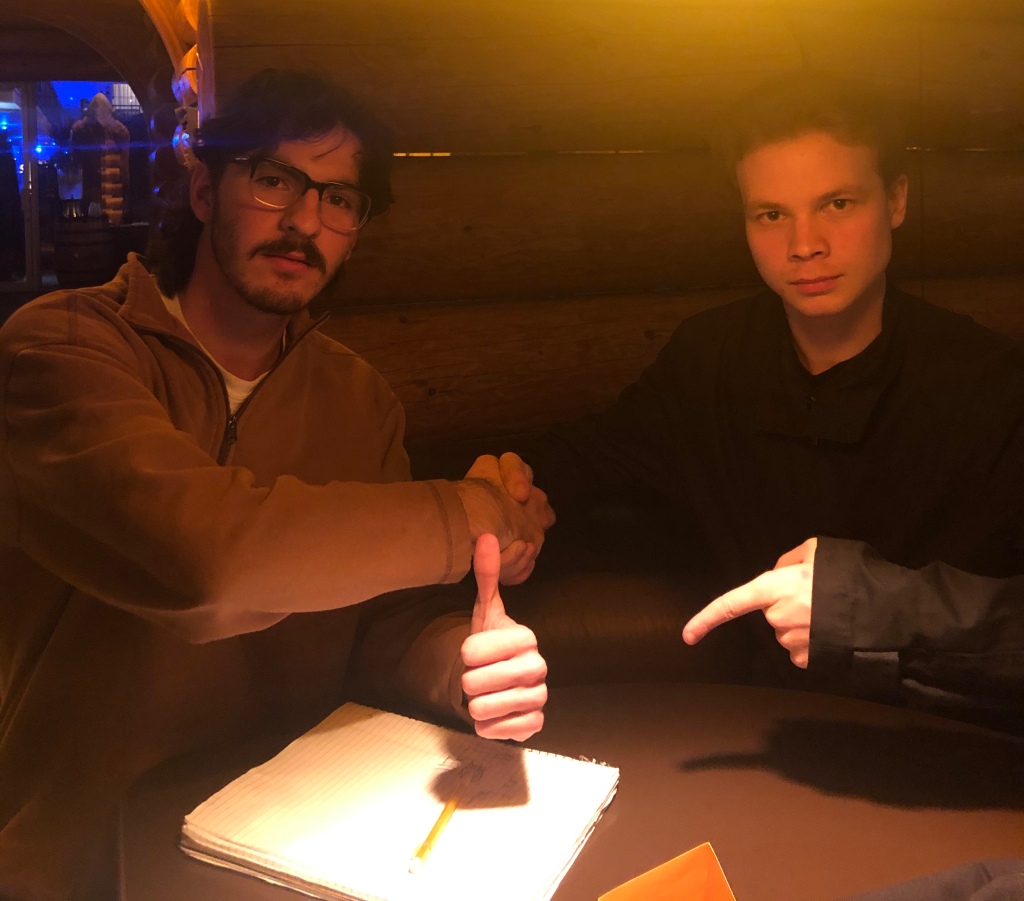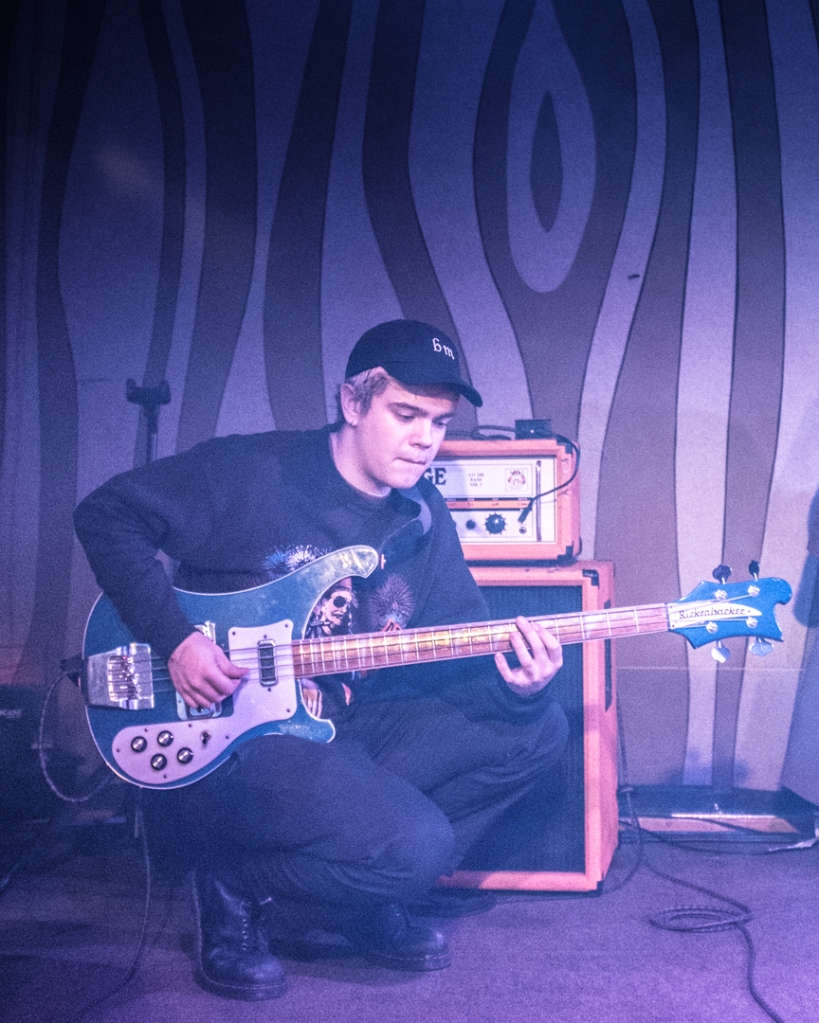Written by Sam Mondros – photos by Jeff Jacobus (IG: @lostversesphotography)

I talked with Geordie Greep (center), frontman for London’s most exciting new art rock quartet, Black Midi, at The Doug Fir Lounge in Portland, Oregon.
“Please stop all of this strange fantasy”

These are the words that open up Black Midi’s debut album “Schlagenheim”. An Ironic omen of what’s to come? Or just tongue in cheek? Black Midi are a four-piece from London, England who have gained popularity on the underground scene in the UK since 2017. All the band members are between the ages of 20-21 and have thus far released one album back in June prefaced by five singles. They gained most of their foreign popularity in the last 10 months after Seattle based radio station, KEXP, released a 26-minute video of them playing a hostel in Reykjavik, Iceland. To try and categorize Black Midi is not an easy task, and would seemingly go against the philosophy of their style. Post-punk, krautrock, math-rock–who knows? Their songs often implode before you can really understand what on earth is happening. To believe that they are in time with one another is simply a leap of faith. A leap that many might not mind taking after hearing their drummer, Morgan Simpson. Otherwise, the band consists of Geordie Greep on rhythm and vocals, Matt Kwasniewski-Kelvin on lead and vocals, and Cameron Picton on Bass, synthesizer, and vocals.

Interview w/ Geordie Greep of Black Midi:
Black Midi kind of represent a slice of the future in music, and on one hand it seems like radio is fading in some more digitally focused crowds as a medium of discovering new music. Yet you guys gained a lot of foreign popularity from the KEXP release of your performance.
Greep: Thank you very much. Well, [KEXP] have adapted to the digital age, videos on youtube and all that. They’ve worked their brand well and thanks to that bands like us can get through.
What do you see as the future of spreading and finding new music?
Greep: We’ve seen it with the internet, everything’s just so spread out and compartmentalized. Everyone can find their own specific type of music. Any record that’s been recorded you can find, you know? Which is unprecedented in history. In the future, I think people are going to be more specific about what they like. Someone could like one specific type of music that’s only existed for sixth months.
How does Black Midi find music? Spotify? Instagram
Greep: Well yeah just all that internet stuff but I still buy CDs ‘cause it keeps things interesting.
What have you been listening to recently?
Greep: Recently? A lot of [Olivier] Messiaen.
The name “Black Midi” is more or less an ode to the genre [Back MIDI] which is a clustered form of composition in which audio files (MIDI files) are used to create a song remix containing hundreds of millions of notes. Is there any irony and/or admiration in your decision to name your band after the genre?
Greep: Nah I just thought it was a cool name really. I think the concept of Black MIDI itself is really cool, it’s just a shame that it’s kind of only a joke. But the idea of having so many notes that the sound becomes unrecognizable and you can take a sound like a piano and make it sound like roaring engines and sirens, I think that’s really cool. Especially when they put so many notes on it that the computer starts to break down and destroy itself. That’s really cool. So it has potential but yeah, the songs they usually do with Black MIDI is always just like a joke–a waste of time, just stupid.

Black Midi, much like the genre, is intense and eclectic. While it is hard to categorize your music you sometimes incorporate specific styles that are so distinguishable, it seems like tongue in cheek juxtaposed with your regular music. For instance, in your live performances, you often will play a blues riff in the middle of one of your more explosive and obscure songs where blues seemingly has no place. Or you played a Van Halen style solo in one of your jams. Are these developments meant to be an ironic play on the styles you’re replicating?
Greep: It keeps it interesting, pretty funny really. but no, no it’s not meant to be ironic. It’s just funny ‘cause it doesn’t really fit with the song. It’s not ironic in the sense that it’s me playing this riff saying ‘blues sucks look at me playing blues’, it’s just me saying ‘it’s just fun, let’s have a good time–not take it so seriously you know?
If you could make a supergroup who would be in it?
Greep: You’ve got to have Luther Vandross on the vocals, you’ve got to have Chet Atkins on guitar, Bach improvising on the pipe organ, on the bass you’ve got to get Flea, hmm I don’t know about the drummer…Mitch Mitchel?…nah nah…well yeah, fine Mitch Mitchell will do.
Any plans on an acoustic session or album?
Greep: Never say never.

Concert Review:
As the band walked on stage Morgan Simpson sat down in front of his kit and proceeded to lay a beat down. The group of long-haired metal-heads in the front row fitted head to toe in black denim already knew what they were there for and their eyes widened as they stood entranced on Simpson’s work. I looked up and saw two security workers of the Doug Fir completely lose their focus and stare at Simpson’s effortlessly fast polyrhythms and syncopations.
Their proceeding set was a mixture of their recorded songs, jams performed with precision, and overall theatrics. Black Midi refused to just start one of their songs like they did on the album. A mess of feedback and distortion would morph into a snippet of a riff that belongs to one of their tracks, which would eventually lead to the intro of the song. Sounds of human screams often erupted in the middle of the performance with no apparent origin since all the musicians were busy with their instruments. The idea of some kind of method to this madness seems ridiculous, but pay close enough attention and you soon realize that every moment in the show has its deeply calculated place. From Greeps avant-garde jazz-rock solo to Cameron Picton completely detuning the highest string on his bass and pulling it out before tossing it on the ground, nothing is accidental. Just when you begin to understand the rhythm and feel your foot begin to tap to it, Black Midi destroys it through synthesized dissonance and starts a new groove twice as complicated.

It’s often hard to distinguish whether the band has started jamming or whether they are showcasing a new song. Their riffs are so concise and angular that it would be hard to believe that it’s all improvised. Black Midi played a setlist just under 45 minutes and in that time continued their trend of redefining contemporary music and entertainment. They have been praised by music icons like David Byrne of Talking Heads and Damo Suzuki of Can. If you have not yet listened to their latest album, “Schlagenheim” it is available on all streaming platforms as well as their latest single, “Sweater”. Head to www.kexp.org to watch their legendary live set in Reykjavik. To hear more music like Black Midi, tune into KWVA 88.1 on Tuesdays 2-4 pm PST.



